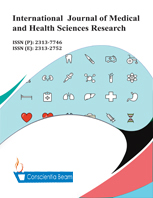Evaluation of the choices and availability of family planning services in Lagos State: A secondary analysis of census-based health facility assessment data from Noi Polls
DOI:
https://doi.org/10.18488/9.v10i1.3303Abstract
Maternal mortality rates remain unacceptably high, especially in developing countries like Nigeria. Nigeria is responsible for about 20% of all global maternal deaths, with a Nigerian woman having a 1 in 18-lifetime risk of dying because of pregnancy or childbirth. Evidence-based strategies have been proposed, including family planning (FP), to reduce the incidence of maternal mortality, which is the only strategy that reduces the proportion of high-risk pregnancies and births and reduces exposure to the risk of maternal mortality. Despite these benefits, there is still a high unmet need for family planning services. The present study assesses the choices and availability of FP services in Lagos state health facilities, examines the challenges, barriers, and cultural restraints to modern contraception, and proffers solutions that will help increase FP uptake in the state. The study also presented supply-and-demand interventions that are most effective at increasing voluntary contraceptive uptake in Lagos state.

